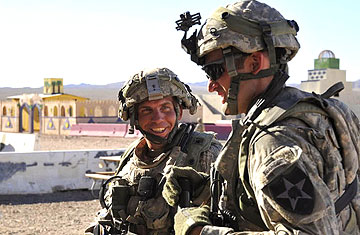
This Aug. 23, 2011, photograph shows Staff Sergeant Robert Bales, left, at the National Training Center in Fort Irwin, Calif.
In 2007, U.S. Army Staff Sergeant Robert Bales participated in a bloody two-day battle in Iraq in which 250 enemy troops died. After the bullets stopped flying, he and his comrades pitched in to assist the wounded and their families. "We ended up helping the people that three or four hours before were trying to kill us," Bales recounted for the Northwest Guardian, the official newspaper of Joint Base Lewis-McChord, near Tacoma, Wash., where he is a soldier in the 3rd (Stryker) Brigade, 2nd Infantry Division. "I think that's the real difference between being an American as opposed to being a bad guy."
Now, about five years later, much has changed. Bales stands accused of being the bad guy — allegedly stealing out of his base near Kandahar, Afghanistan, in the early-morning hours of March 11, and going house to house in search of people to kill. He reportedly found 16, setting some of their bodies aflame. Nine of the dead were children. That statistic is particularly horrifying: Bales is a father of two preschoolers, ages 3 and 4.
As Bales awaits charges in a military prison at Fort Leavenworth, Kans., his friends, neighbors and family are struggling to reconcile news reports of a mass murderer with memories of a high school football player who helped out a special-needs child in Ohio, where he grew up. Neighbor Paul Wohlberg, who lives on Bales' street in Lake Tapps, Wash., would watch sports on television with Bales, an Ohio State fan. "From what I know of Bob, he's a good guy," says Wohlberg. "What happened in Afghanistan is a creation of the war. That's not the person that I knew."
Colleagues and supervisors report being incredulous that a man described by many as a "model soldier" has been implicated in the rampage; one of his former commanding officers told the Seattle Times that when he learned Bales' name had been released in conjunction with the shootings, "I nearly fell off my chair, and I had a good cry." At 38, Bales was more mature than most soldiers, who are about 10 to 15 years his junior; his comrades describe him as a stable force who wasn't easily rattled.
A statement released over the March 17-18 weekend by Bales' defense team has reinforced that "Sergeant Bales' family is stunned in the face of this tragedy, but they stand behind the man they know as a devoted husband, father and dedicated member of the armed services." That's typical, says Harold J. Bursztajn, a forensic psychiatrist and co-founder of the Program in Psychiatry and the Law at Harvard Medical School. "All the facts are still shrouded in the fog of war," says Bursztajn. "It will take a comprehensive psychiatric evaluation to understand what went on when it seems so bizarre relative to this man being a family man who appears to have a capacity to love and be loved."
Bales' wife Karilyn has not spoken publicly, but she blogged a description of the man she married in 2005 as eager to learn the sex of their first child ("He simply cannot wait for the surprise to come") and his disappointment in 2011 about being passed over for a promotion after nine years at Lewis-McChord. Trying to be positive, Karilyn wrote that she and her husband hoped "that if we are proactive and ask to go to a location ... the Army will allow us to have some control over where we go next." Their top choices: Germany ("best adventure opportunity!"), Italy ("2nd best adventure opp") and Hawaii ("nuff said").
Instead of embarking on a European adventure, however, Robert Bales was unexpectedly deployed to Afghanistan. More than half of Stryker's 4,000 soldiers are in Afghanistan, but Bales had no interest in going after spending more than three years in Iraq. "In fact, he was told he was not going to go," Bales' defense lawyer John Henry Browne told the Seattle Times. "Then, really almost overnight, that changed."
Could resentment over missing out on a promotion and the strain of an unwanted deployment have contributed to Bales' discontent? The toll that repeated tours of duty take on soldiers and their families at home is a mental-health phenomenon that's getting more attention. "Maybe he didn't want to be deployed," says Bursztajn. "But that is no explanation. We shouldn't confuse risk factors with explanations at this point."
Court records show that Bales already had run afoul of the law several times, including a 2002 arrest for assaulting a girlfriend that ended with Bales' being ordered to attend 20 hours of anger-management sessions. He was also arrested for drunk driving in 2005, although he does not seem to have been charged, and paid $250 three years later to have a misdemeanor hit-and-run dismissed.
